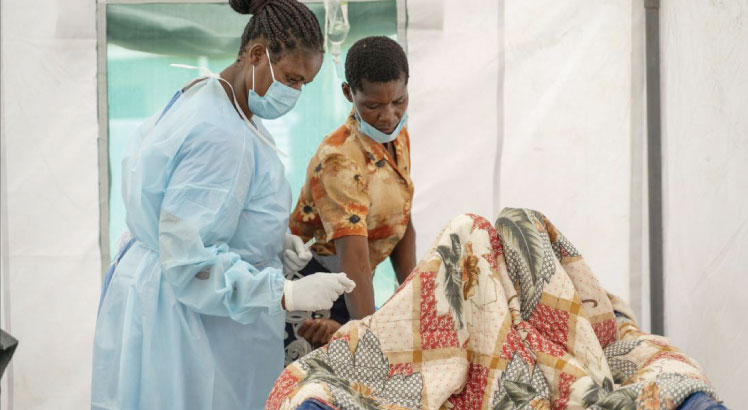Claims dismissing the existence of cholera as a simple diarrhoeal infection have taken a toll on Malawi’s response to the deadliest outbreak that has claimed more than 1 500 lives in a year.
“This cannot be cholera. Officials are lying to us,” a street vendor known as Joe, screams to a crowd at Lilongwe Old Town. “It’s a conspiracy to kill people, especially men, and use the situation to make more money.”
On Joe’s side of the road, just about 400 metres from a Cholera Treatment Centre at Bwaila Hospital, some street vendors applaud him for his words while a surprised woman on the other side questions Joe’s thinking and conspiracy theory.
“This is one of our biggest challenges fuelling the spread of cholera,” says Collins Nkhulazi, a clinical officer at Bwaila. “Some community members do not have correct information about cholera. They think there is no cholera, yet it is real and we need them to play their part to prevent and stop the outbreak.”
Nkhulazi partly blames the denial of cholera existence for the high number of cholera deaths.
He thinks the fatality rate can be easily reduced if communities understood cholera well and got treatment swiftly.
Mercy Mayenje cares for a cholera patient at Area 18
“We have two mortuaries at this hospital just for cholera deaths which are occurring mainly due to late coming of cholera cases,” he says.
Agnes Mamme, a nurse at Bwaila Hospital, says the misconceptions could be the reason cholera patients to not seek treatment on time.
“The community perception is making our work difficult. People need to accept that cholera is real and preventable by using safe water and having good sanitation and hygiene,” she says.
Misplaced religious beliefs, ignorance and illiteracy are some of the factors compounding cholera misinformation and disinformation, according to Kedson Masiyano, the chief clinical officer at Area 18 Health Centre in the capital city.
He narrates: “We have had incidents where some people have died at home because their relatives thought they were attacked by demons and called religious leaders to lay hands on them to exorcise the demons.
“The people come here just to confirm the deaths. When we tell them that the patients died of cholera, they refuse and create their own reasons for the deaths. We struggle to reason with them.”
To fight cholera misinformation, Masiyano says health officials have teamed up with the media, community leaders, the police, and other stakeholders to sensitise people on the disease.
“We are providing health talks at the health centre, telling people cholera is real. We enlighten them on how cholera spreads and what they can do when someone gets it. Other health workers go into the communities to chlorinate, sensitise the people, and counter the myths and misconceptions. They also promote hand-washing with soap and chlorinated water for drinking.
“We are also utilising local leaders and engaging them to help us disseminate correct information to their people. When relatives completely refuse to take cholera patients to the hospital, the police go into the communities to force people to come to the hospital,” he says.
Secretary for Health Charles Mwansambo says the Ministry of Health is strengthening community engagement and risk communication in the cholera response with support from Unicef and other partners.
“Risk communication and community engagement are very critical. We know that cholera causes severe dehydration very quickly, and as a ministry, we are working with several organisations to get to the people and give them the right messages about cholera,” he says.
Unicef risk communication and community engagement support to the response includes social behavioural change and mass communication interventions that have been engaging communities with essential cholera messages through household visits, community dialogues, radio, television and digital channels, and radio listeners’ groups, among others.
With Unicef support, leaders of four religious denominations are also collaborating to promote health-seeking behaviours, use of oral rehydration solution (ORS) and hygiene practices among their followers in cholera hotspot districts.
Unicef country representative Rudolf Schwenk says effective communication and engagement with the public during the outbreak are crucial not only for the rapid control of the spread of the disease but also to keep communities informed and reduce the risk of violent reactions against health workers who are working tirelessly to help patients and save lives.
“Through our collaboration with the Ministry of Health, we continue to scale up efforts to engage different stakeholders at the national and community levels to ensure key messages on cholera reach all people in affected communities. We are also strengthening feedback mechanisms to ensure people’s concerns on cholera are adequately addressed in the response,” says Schwenk.
Mamme and Nkhulazi believe the faster misinformation on cholera is fully tackled, the greater the chances of containing the outbreak, and Schwenk says Unicef is ramping up support to help authorities achieve that.n
The post Tackling cholera myths to save lives first appeared on The Nation Online.
 Moni Malawi
Moni Malawi 
